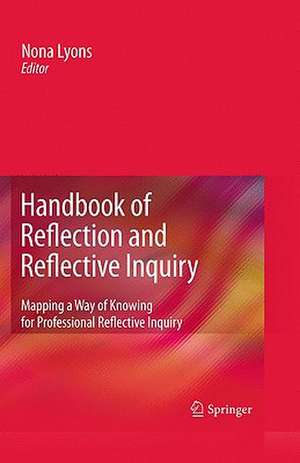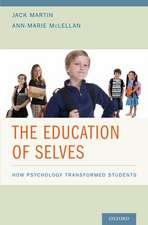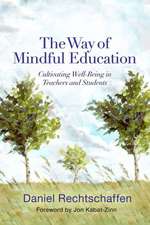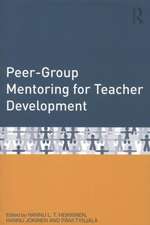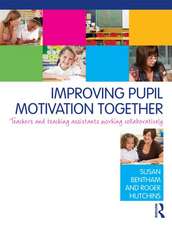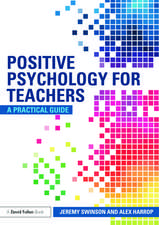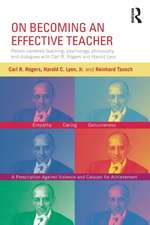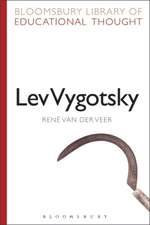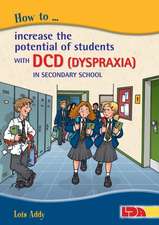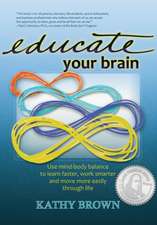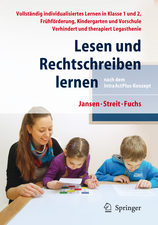Handbook of Reflection and Reflective Inquiry: Mapping a Way of Knowing for Professional Reflective Inquiry
Editat de Nona Lyonsen Limba Engleză Hardback – 16 dec 2009
Educators across the professions as well as adult educators, counselors and psychologists, and curriculum developers concerned with adult learning will find the Handbook of Reflection and Reflective Inquiry an invaluable teaching tool for challenging times.
| Toate formatele și edițiile | Preț | Express |
|---|---|---|
| Paperback (1) | 1839.50 lei 6-8 săpt. | |
| Springer Us – 22 aug 2016 | 1839.50 lei 6-8 săpt. | |
| Hardback (1) | 1847.03 lei 6-8 săpt. | |
| Springer Us – 16 dec 2009 | 1847.03 lei 6-8 săpt. |
Preț: 1847.03 lei
Preț vechi: 2252.48 lei
-18% Nou
Puncte Express: 2771
Preț estimativ în valută:
353.48€ • 365.16$ • 294.18£
353.48€ • 365.16$ • 294.18£
Carte tipărită la comandă
Livrare economică 26 martie-09 aprilie
Preluare comenzi: 021 569.72.76
Specificații
ISBN-13: 9780387857435
ISBN-10: 0387857435
Pagini: 606
Ilustrații: XXXIII, 606 p.
Dimensiuni: 178 x 254 x 41 mm
Greutate: 1.32 kg
Ediția:2010
Editura: Springer Us
Colecția Springer
Locul publicării:New York, NY, United States
ISBN-10: 0387857435
Pagini: 606
Ilustrații: XXXIII, 606 p.
Dimensiuni: 178 x 254 x 41 mm
Greutate: 1.32 kg
Ediția:2010
Editura: Springer Us
Colecția Springer
Locul publicării:New York, NY, United States
Public țintă
ResearchDescriere
Philosophers have warned of the perils of a life spent without reflection, but what constitutes reflective inquiry—and why it’s necessary in our lives—can be an elusive concept. Synthesizing ideas from minds as diverse as John Dewey and Paulo Freire, theHandbook of Reflection and Reflective Inquiry presents reflective thought in its most vital aspects, not as a fanciful or nostalgic exercise, but as a powerful means of seeing familiar events anew, encouraging critical thinking and crucial insight, teaching and learning. In its opening pages, two seasoned educators, Maxine Green and Lee Shulman, discuss reflective inquiry as a form of active attention (Thoreau’s "wide-awakeness"), an act of consciousness, and a process by which people can understand themselves, their work (particularly in the form of life projects), and others. Building on this foundation, the Handbook of Reflection and Reflective Inquiry analyzes through the work of 40 internationally oriented authors:
- Definitional issues concerning reflection, what it is and is not
- Worldwide social and moral conditions contributing to the growing interest in reflective inquiry in professional education
- Reflection as promoted across professional educational domains, including K-12 education, teacher education, occupational therapy, and the law, among others
- Methods of facilitating and scaffolding reflective engagement
- Current pedagogical and research practices in reflection
- Approaches to assessing reflective inquiry
Cuprins
Contents Preface Contributors Part I: Reflection and Reflective Inquiry Chapter 1: Reflection and Reflective Inquiry: Critical Issues, Evolving Conceptualizations, Contemporary Claims and Future Possibilities. Nona Lyons Part II: Foundational Issues: Needed Conceptual Frameworks Chapter 2. Foundational Issues – 'a deepening of conscious life.' Nona Lyons Chapter 3. The Role of Descriptive Inquiry in Building Presence and Civic Capacity. Carol Rodgers Part III: Reflective Inquiry in the Professions Chatper 4. Teacher Education: A Critical Analysis of Reflection as a Goal for Teacher Education. Ken Zeichner & Katrina Yan Liu Chapter 5. Education for the Law: Reflective Education for the Law. Filippa Marullo Anzalone Chapter 6. Medical Education: Reflective Inquiry in the Medical Profession. C. Anthony Ryan Chapter 7. Occupational Therapy: Occupational Therapy as Reflective Practice. Ellen S. Cohn, Barbara A. Boyt Shell, & Elizabeth Blesedell Crepeau Chapter 8. Nursing Education: Application of Critical Reflective Inquiry in Nursing Education. Hesook Suzie Kim, Laurie M. Lauzon Clabo, Patricia Burbank, Mary Leveillee, Diane Martins. Chapter 9. Social Work Education: Reflective Inquiry in Social Work Education. Marian Murphy, Maria Dempsey, Carmel Halton Chapter 10. Teaching: Reflective Practice in the Professions: Teaching. Cheryl Craig Chapter 11. Adult Education: Critical Reflection as an Adult Learning Process. Stephen Brookfield Chapter 12. Education for Probation Services: Fostering Reflective Practice in the Public Service: A Study of the Probation Service in the Republic of Ireland. Carmel Halton Part IV. Facilitating and Scaffolding Reflective Engagement: Considering Institutional Contexts Chapter 13. A Child Study/Lesson Study: Developing Minds to Understand & Teach Children. Joan V. Mast & Herbert P. Ginsburg Chapter 14. Within K-12 Schools for School Reform: What does it take? Michaelann Kelley, Paul D. Gray, Donna Reid, & Cheryl Craig Chapter 15. Reflective Inquiry in the Round. Steve Seidel Part V. Professional Pedagogies and Research Practices: Teaching and Researching Reflective Inquiry, Cheryl Craig Chapter 16. As Inquiry. Anna Richert & Clare Bove Chapter 17. As Self-Study: 'Doing as I Do': The Role of Teacher Educator Self-Study in Educating for Reflective Inquiry. Vicki Kubler LaBoskey & Mary Lynn Hamilton Chapter 18. Through a Portfolio Process: Professional Pedagogies and Research Practices: Teaching & Researching Reflective Inquiry through a Medical Portfolio Process. Martina Kelly Chapter 19. As Narrative Inquiry: Narrative Inquiry as Reflective Practice: Tensions and Possibilities. Charles Aidan Downey & D. Jean Clandinin Chapter 20. Reflection Through Collaborative Action Research and Inquiry. John Loughran Chapter 21. Through Curriculum Design: Developing Transformative Curriculum Leaders Through Reflective Inquiry. Chen Ai Yen & Da
Textul de pe ultima copertă
Philosophers have warned of the perils of a life spent without reflection, but what constitutes reflective inquiry—and why it’s necessary in our lives—can be an elusive concept. Synthesizing ideas from minds as diverse as John Dewey and Paulo Freire, theHandbook of Reflection and Reflective Inquiry presents reflective thought in its most vital aspects, not as a fanciful or nostalgic exercise, but as a powerful means of seeing familiar events anew, encouraging critical thinking and crucial insight, teaching and learning. In its opening pages, two seasoned educators, Maxine Green and Lee Shulman, discuss reflective inquiry as a form of active attention (Thoreau’s "wide-awakeness"), an act of consciousness, and a process by which people can understand themselves, their work (particularly in the form of life projects), and others. Building on this foundation, the Handbook of Reflection and Reflective Inquiry analyzes through the work of 40 internationally oriented authors:
- Definitional issues concerning reflection, what it is and is not
- Worldwide social and moral conditions contributing to the growing interest in reflective inquiry in professional education
- Reflection as promoted across professional educational domains, including K-12 education, teacher education, occupational therapy, and the law, among others
- Methods of facilitating and scaffolding reflective engagement
- Current pedagogical and research practices in reflection
- Approaches to assessing reflective inquiry
Caracteristici
Brings together essential perspectives of researchers, practitioners, and theoreticians
Comprehensive treatment of Reflective Inquiry from a complete perspective including historical background, current issues, and future directions
Presents thorough overview of Reflective Inquiry in several professions including teacher education, medical education, social work education, and adult and business education
Provides guidance and tested pedagogical practices
Includes supplementary material: sn.pub/extras
Comprehensive treatment of Reflective Inquiry from a complete perspective including historical background, current issues, and future directions
Presents thorough overview of Reflective Inquiry in several professions including teacher education, medical education, social work education, and adult and business education
Provides guidance and tested pedagogical practices
Includes supplementary material: sn.pub/extras
